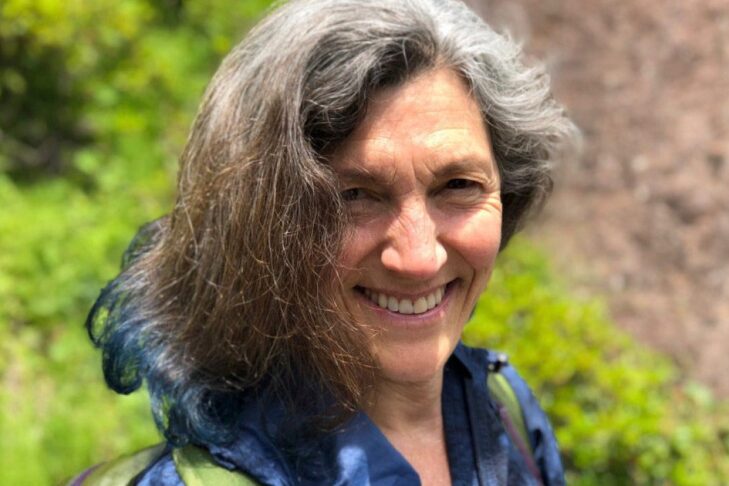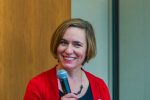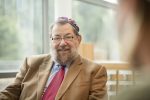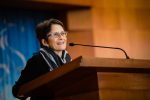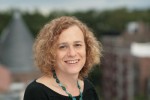“The more we can move toward this poetic sense of reality, breaking up received notions about the world, I think that’s going to release the potential of our humanity across the board, whether we’re talking about young children in education and rabbis and whoever else. I think it’s that ability to break up received notions, to explode them, that allows the kind of truly creative energy to come into being.”
—Anne Germanacos
In this episode of “Speaking Torah,” Rabbi Mónica Gomery reflects on Moses’s poem “Ha’azinu.” In her essay, she looks at the truth and the falseness of poetry, how our identities and experiences aren’t fixed and how that expands our sense of what’s possible.
Rabbi Mónica Gomery was ordained by the Rabbinical School of Hebrew College in 2017 and serves as one of the rabbis at Kol Tzedek Synagogue in West Philadelphia, where she’s the music director and prayer leader of the community. We invited Anne Germanacos to read Mónica’s essay. Anna is a writer, activist and educator living in San Francisco. She contributes time and other resources to a wide variety of individuals and organizations through the Germanacos Foundation and Firehouse Fund: Cultivating Sparks.
Listen in this episode as Anne Germanacos reads Mónica’s d’var Torah, written in 2019, highlighting this piece’s ever-increasing relevance in a world of post-truths and “alternative facts.” Mónica shares with us how leaning into that which doesn’t make narrative sense highlights the greater truths that can fly under our rational mind.
Listen to the full episode here, or on Apple Podcasts, Stitcher or Spotify.
What you’ll discover from this episode:
- How a poetic way of breaking down truth allows a deeper truth to shine through the fissures that remain
- The contrast between a poetic breaking down of the truth and how we have seen the truth manipulated in recent years
- What makes metaphor as necessary to theology despite its inherent fictionality
- How poetry can help us understand and interpret Torah beyond what is obvious and simple
- The role of poetry asking us to hold what is true, what is untrue and what is beyond true
- How Parshat Ha’azinu asks us to lean into the ways that language can be surprising and disruptive
Featured on this episode:
Rabbi Mónica Gomery (writer) was ordained by the Rabbinical School of Hebrew College and serves as one of the rabbis at Kol Tzedek Synagogue in West Philadelphia, where she is the music director and prayer leader of the community. She also teaches liberatory text as a faculty member at SVARA: A Traditionally Radical Yeshiva and as a member of the founding leadership team of Let My People Sing!. Mónica has served as a prison and geriatric chaplain and educator, and is a published poet—her poem “Ars Poetica” was featured as the Dec. 22, 2020, Poetry Foundation’s Poem of the Day.
Anne Germanacos is a writer, activist and educator living in San Francisco. She contributes time and other resources to a wide variety of individuals and organizations through the Germanacos Foundation and Firehouse Fund: Cultivating Sparks. For more information on Anne’s books, teaching and philanthropy, visit mergemerge.com.
Rabbi Jeffrey Summit, Ph.D. (host), is director of the Hebrew College Innovation Lab. He is research professor in the department of music and Judaic studies at Tufts University and senior consultant for Hillel International. The author of several books, among his many awards are a 2018 Hebrew College honorary degree, a Grammy nomination for his album “Abayudaya: Music from the Jewish People of Uganda,” the Edgar M. Bronfman Award for Lifetime Accomplishment in Hillel Professional Leadership and the Tufts Hosea Ballou Medal.
Torah is one of the most profound sources of wisdom available to us. In Hebrew College’s new podcast, “Speaking Torah,” Jewish leaders from around the world read essays from Hebrew College faculty and rabbinical alumni about how Torah can help us navigate the most pressing issues of our time. Together, we explore the ways Torah can help us approach the world with creativity, healing and hope. Find out more at hebrewcollege.edu/podcast.
This post has been contributed by a third party. The opinions, facts and any media content are presented solely by the author, and JewishBoston assumes no responsibility for them. Want to add your voice to the conversation? Publish your own post here. MORE


